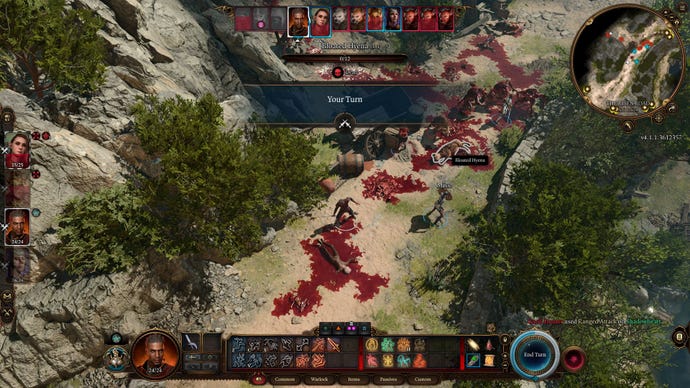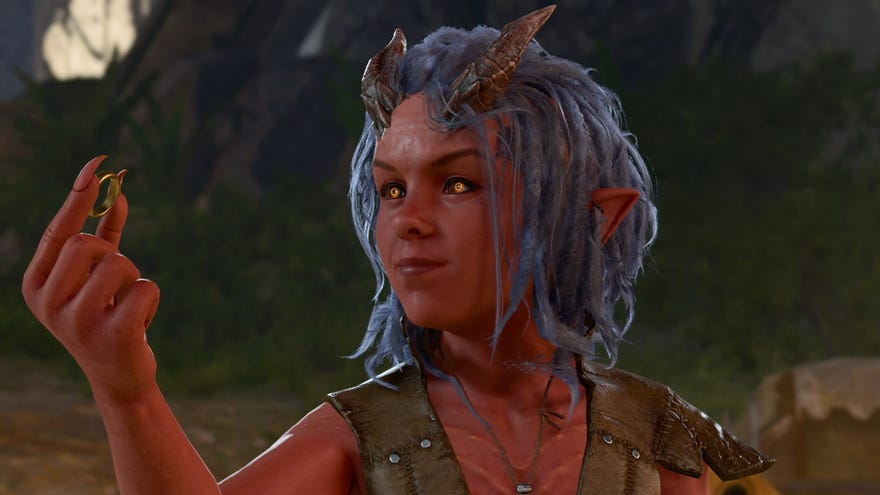Baldur's Gate 3 is Metacritic's highest-rated PC game ever, but devs are rejecting cheap comparisons
Where's that Calm Emotions spellslot
Little-CRPG-that-could Baldur's Gate 3 has solved the Labyrinth, outwitted the Sphinx and ascended to the rank of Metacritic's highest-rated PC game of all time, knocking ZA/UM's Disco Elysium into second place. (OK, so technically they're both on 97, but I'm guessing the "score distillation" arithmetic behind-the-scenes puts Baldur's Gate 3 ahead - their positions were reversed last time I checked.) This follows a busy weekend for Larian's new game, which exceeded its own online player activity record on Sunday to the tune of around 875,000 players.
It's a terrific achievement for one of the richest and most rewarding D&D adaptations ever set to code. It's also only going to encourage those on the interwebs who are using Baldur's Gate 3's success as a stick to beat other developers with. As you've likely discovered for yourself, the new game is the centre of a raging discussion about what we should expect from today's "triple-A games", aka "biggest/shiniest". Some point to its lack of microtransactions or DRM, while others highlight its relative technical sturdiness and overall "quality". A few people go into specifics: I've read a couple of thoughtful comments comparing the bespoke, one-and-done nature of Baldur's Gate 3 quests with open world action titles and other genres that hinge on repeated quest formulas and reward systems.
Still, it's all very apples-to-oranges, and developers are pushing back. They've been pushing back since well before launch, actually. A few weeks before release in July, Strange Scaffold founder (and gosh, former RPS contributor?!) Xalavier Nelson Jr threaded about players using their excitement for Baldur's Gate 3 "to apply criticism or a 'raised standard' to RPGs going forward". Rather than drawing hasty comparisons, he wrote, it's important to consider Baldur's Gate 3's accomplishments with and against the specifics of its development and production circumstances. It represents the work of over 400 people around the globe, and builds on institutional knowledge amassed from the Divinity series, together with three, lucrative years in early access to harvest community feedback and squash bugs.
All of which reflects Nelson Jr's own, broader desire for greater transparency and understanding between developers, press and players. As he said when I interviewed him a little while back for NME: "change the conditions in which you make a thing and you change the thing you make. That's common sense for any other medium. But in games, I don't see this truth acknowledged quite often."
Nelson Jr's thoughts have struck a chord with the game development community, with other developers elaborating on the point and bringing their own perspectives. For National Insecurities lead designer Gary J Kings, Baldur's Gate 3 is an "anomaly" in an industry that is increasingly unable to take risks, constrained as it is by "greater scopes and budgets" and "ballooning dev times" that could sink studios unless their games are a meteoric success. As far as Kings is concerned, "the industry conditions that birthed Larian and let them hone their craft over several games before they made Baldur's Gate 3 no longer exist. THAT'S why it's unreasonable to expect this to become the 'new standard'."

Night in the Woods developer Scott Benson was more whimsical in his assessment. "Just left the game dev coffee shop and we're all really mad and upset and afraid because of Baldur's Gate 3's scope and quality," he wrote on Sunday. "Everyone is threatened because someone finally made a giant very expensive well received rpg with voice acting. Now we all have to do that. Very upset".
Not to be a gigantic fence-sitter, but I think there's a grain of fairness to some of the player objections above, specifically those that concern monetisation tactics and game systems that are shaped by them. While I understand that development studios of all sizes are under nightmarish pressure to break even, I find it draining that so many bigger-budget games are set up like storefronts, always striving to sell me something and so, sabotaging their own enchantment as experiences or places. You may not outright have to buy the associated add-on skins or what-have-you, but you do have to expend mental labour filtering it all out, and I would much rather spend that energy forming crackpot theories about in-game schools of magic. Baldur's Gate 3 feels like a world apart. But none of that justifies some of the lazy conclusions I've seen from some quarters about how other developers simply need to "try harder".
I'll leave you with Alice's Baldur's Gate 3 review, plus some rift-mending thoughts from Michael Gamble, project director at Bioware on the next Mass Effect. "Well, @baldursgate3 is everything I wanted it to be, and more. As a fan, it gets me excited. As a developer, it gets me excited. Even if you aren't into DnD, you should give it a try."
Disclosure: Former RPS deputy editor Adam Smith (RPS in peace) now works at Larian and is the lead writer for Baldur's Gate 3. Former contributor Emily Gera also works on it.









